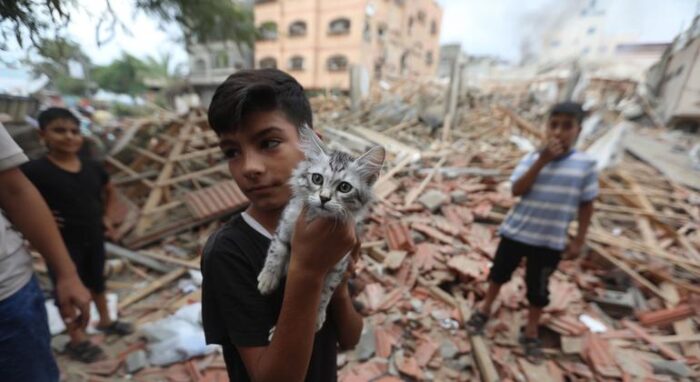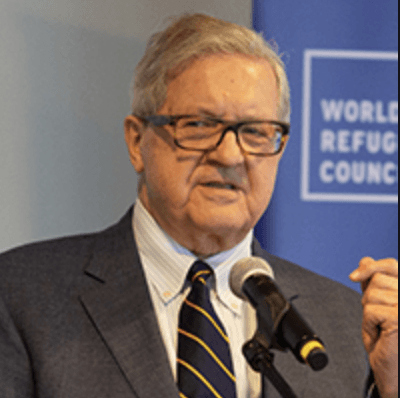By Lloyd Axworthy and Allan Rock
This article was first published in The Globe and Mail.
The tragic war between Israel and Hamas has exposed deep divisions in Canada and elsewhere. Fingers have been pointed, voices have been raised, provocative accusations have been made, and moral outrage abounds. Amidst the cacophony and the painful images, one can feel helpless. But there is one subject on which broad agreement might build a wider consensus on the path ahead.
We speak of the plight of children.
There is little doubt that children have paid a heavy price from the start. Hamas’s unspeakable crimes on Oct. 7 included the murder and abduction of children. In the weeks since, hundreds of thousands of Israelis, including children, have been displaced, especially near the border with Lebanon. And Gazan children under 18 — comprising almost half of the region’s population of two million — have endured displacement too, as well as a lack of food, water and electricity. Israel’s military campaign has killed more than 10,000 Palestinians to date, according to the Gaza Health Ministry, including more than 4,100 children.
With so much else at issue, we should agree at least on this: the children on both sides of the Israeli-Gaza border are blameless. They deserve and need protection. All hostages must be returned immediately and unconditionally, and to protect civilians of all ages, hostilities must be conducted by both parties in a way that reflects the most basic principles of international law: distinguishing between military and civilian targets, rejecting indiscriminate attacks, maintaining proportionality, and taking reasonable precautions.
Shielding children from armed conflict was once an international priority. Graça Machel’s landmark 1996 report demonstrated the disproportionate impact of war on children and made sweeping recommendations for their protection. Canada convened a global conference on the subject in Winnipeg the next year, then led the effort, while on the Security Council in 1999, to create the post of Special Representative for Children and Armed Conflict, as Ms. Machel had recommended. Canada also helped establish the subject as a permanent item on the Security Council’s agenda, reflecting our commitment to human security in general and the protection of civilians in particular. We then promoted the adoption of Council resolutions that hold to account parties to conflict that committed “grave violations” of children’s rights.
With those measures, the world seemed on the right track. But in retrospect, it was the terrorist attacks of Sept. 11, 2001, that started the unravelling of the collective commitment toward the protection of civilians and children. The U.S.-led coalition’s response to that tragedy included the illegal invasion of Iraq, the official sanction of torture, and the establishment of “black sites” out of the world’s view; the coalition seemed to say, “We can do what we want, and we will.”
Vladimir Putin’s Russia also contributed to the downward spiral, first in Georgia and later in Ukraine, with almost a decade of apparent war crimes in Syria in between. These acts have been committed with impunity, as have those of the Saudi-led coalition in Yemen, the military in Myanmar (and the genocide of the Rohingya), and the casual brutality committed against civilians, including children, by military factions in Sudan, South Sudan, Central African Republic, and the Democratic Republic of Congo, among others.
Perhaps Anne Applebaum was right when she wrote recently in The Atlantic: “Open brutality has again become celebrated in international conflicts, and a long time may pass before anything else replaces it.”
It doesn’t have to be this way. There is scope for leadership, and Canada can provide it. Drawing on a long history of achievement and activism, we can focus on children through the clash of opinions and pose one simple question: Do we not all love our children, and thus want to spare them the horrors of war?
We can use our much-touted “convening power” to bring people together – heads of government and civil society alike – to reaffirm our commitment to the protection of children, and to bring fresh urgency to the need to stop the war and, in the meantime, to conduct it in accordance with the rules of humanity.
Surely the best response to the helplessness so many feel about the Middle East is to identify a worthy purpose and then marshal the means and resolve to achieve it. Canada will not bring about change with military force, but we can make this a safer, fairer and better world by seeking the renewal of the world’s commitment to the safety of children in war. That just might create enough common ground on which to build peace.
Photo: A five-year-old boy holds up his cat amidst the wreckage of his home in Gaza (© UNICEF/Mohammad Ajjour)


